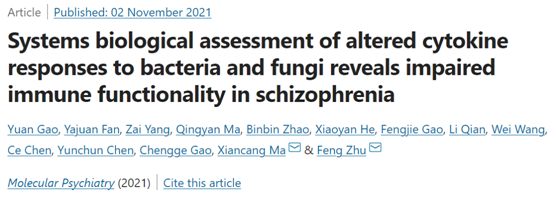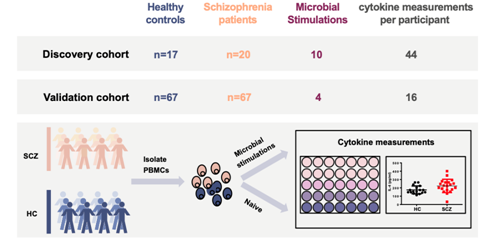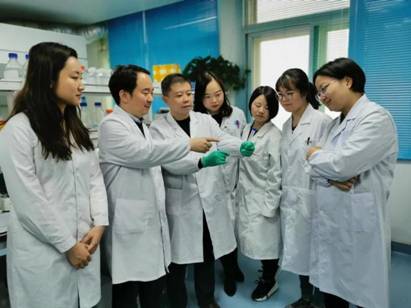On November 2, 2021,Molecular Psychiatry, a top-notch international journal in the field of pscychiatry and one academic journal of Nature, published the latest research results of the team led by Professor Ma Xiancang and Professor Zhu Feng, which elucidated the mechanism of gut-immune-brain axis in schizophrenia as an online Article entitled Systems biological assessment of altered cytokine responses to bacteria and fungi reveals impaired immune functionality in schizophrenia.

Schizophrenia is a psychiatric disease with high disability rate, and the lifetime prevalence rate is estimated to be 1%. Although the pathogenesis has not been fully elucidated, the role of peripheral immune system in the incidence and progression of schizophrenia has captivated widespread attention. Immune disorder is considered as a persistent pathophysiological phenomenon of schizophrenia rather than simply the consequences of disease progression. Epidemiological studies have also confirmed that early infection and autoimmune diseases will increase the risk of schizophrenia. Nevertheless, although the causal relationship between immune alterations and schizophrenia has been studied for several decades, the origin and cause of persistence of immune activation remain elusive. One of the important reasons is the lack of an appropriate in vitro models to explore the functional changes of immune cell physiology. In this study, the cytokine responses of peripheral blood mononuclear cells (PBMCs) derived from patients with schizophrenia and controls against bacterial, fungal, and purified microbial ligands were systematically compared, and the aberrant cytokine response patterns to various pathogens were identified.
This study found that the cytokines induced by the same type of stimulator have more pronounced correlation after stimulated by 10 pathogens or microbial ligands. In addition, the cytokines derived from monocytes and T cells formed two relatively independent clusters in the healthy controls. However, in schizophrenic patients, the difference between these two clusters was significantly reduced, suggesting that the correlation among varying cytokines was weakened or even lacking.
Interestingly, the cytokine production by PBMCs of schizophrenic patients after stimulation with muramyl dipeptide (MDP) was significantly lower than that of healthy controls. Besides, the serum MDP levels were elevated in schizophrenicpatients and correlated with the course of disease, suggesting increased bacterial translocation and declined immune response along with disease progression. These findings prompted that MDP might be one of the upstream mediators of immune activation in schizophrenic patients, and the low-level inflammation induced by MDP might lead to the changes of gut barrier permeability and the entry of microbial products into the peripheral circulation, resulting in potential mutual interplay.

In this study, the single-cell RNA sequencing on PBMCs from schizophrenic patients and healthy controls was performed before and after MDP stimulation, revealing widespread suppression of antiviral and inflammatory programs as well as impaired chemokine/cytokine-receptor interaction networks in various immune cell subpopulations of schizophrenic patients after MDP stimulation.
Overall, this study delineated the molecular and cellular landscape of impaired immune function in schizophrenia, and proposed a mutual interplay between innate immune impairment, reduced pathogen clearance, increased MDP translocation along schizophrenia development, and blunted innate immune response, providing new insights into the pathogenic mechanisms that drive systemic immune activation, neuroinflammation, and brain abnormalities in schizophrenia.
Doctoral students Gao Yuan and Fan Yajuan (enrollment in 2018) are both the first authors. Professor Zhu Feng and Professor Ma Xiancang are equally the corresponding authors. The First Affiliated Hospital of Xi 'an Jiaotong University (XJTU) is the only affiliation.
Molecular Psychiatry is a top-notch international journal in the field of psychiatry and an academic journal of Nature, with the latest impact factor of 15.992. In recent years, the team led by Professor Ma Xiancang and Professor Zhu Feng has been devoted to the latest global scientific topic of genetic variation-gut bacteria-immune system-brain axis. This is the 3rd time after the team previously reported the latest research results related to the gut-brain axis in Molecular Psychiatry in 2019 and Nature Communication in 2020. The team will continually conduct more in-depth research on the relationship between gut bacteria-mediated immune changes and schizophrenia.

A group photo of Professor Ma Xiancang (second from the left), Professor Zhu Feng (third from the left), doctoral student Gao Yuan (first from the right), and doctoral student Fan Yajuan (third from the right).
This study was jointlysupported by Surface Project of National Natural Science Foundation of China, Science Foundation Project for Outstanding Youth Scholars and Key Project of Natural Science Foundation of Shaanxi Province.
Article link:https://www.nature.com/articles/s41380-021-01362-0